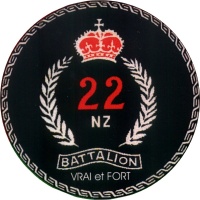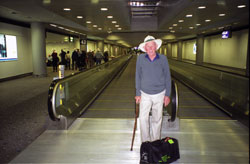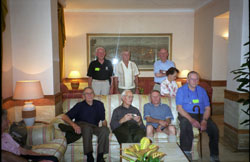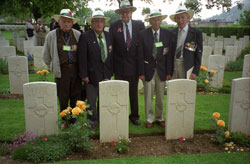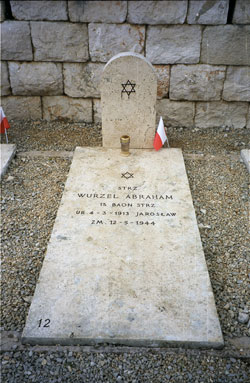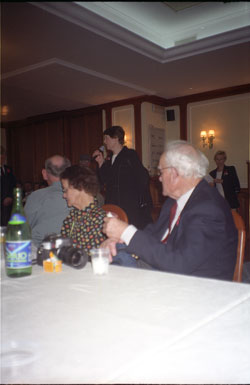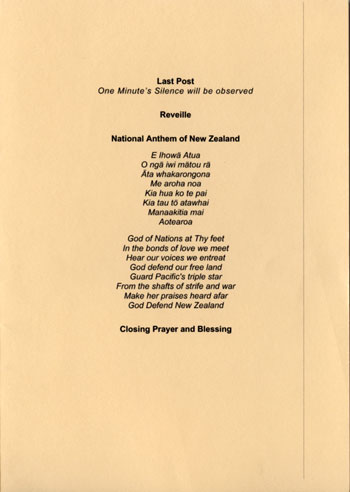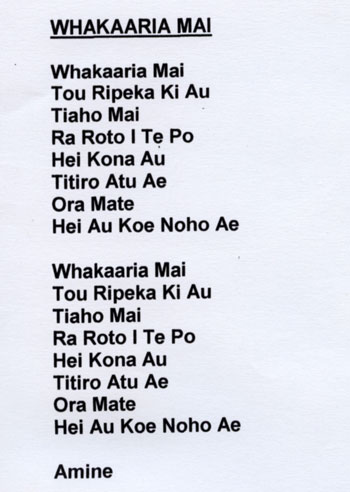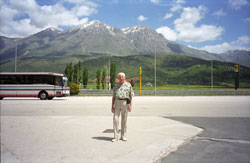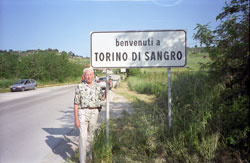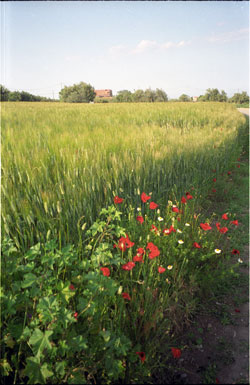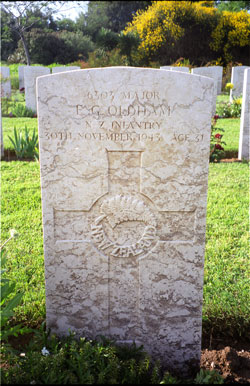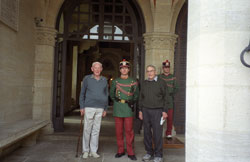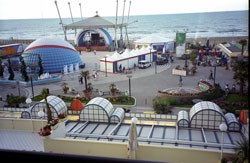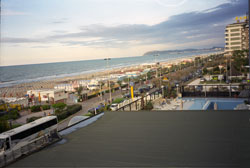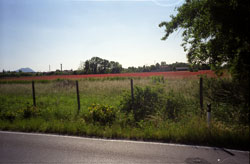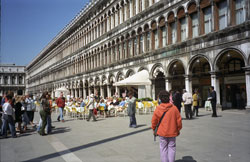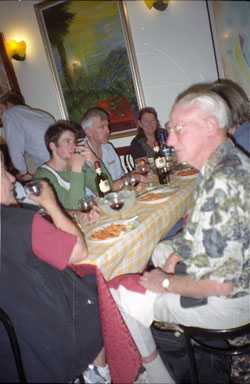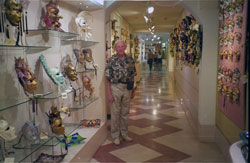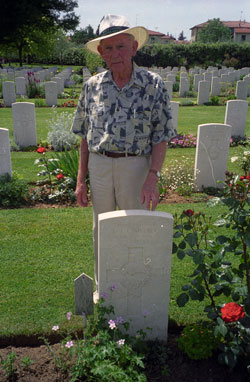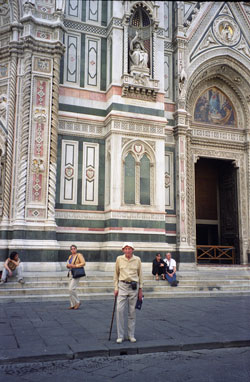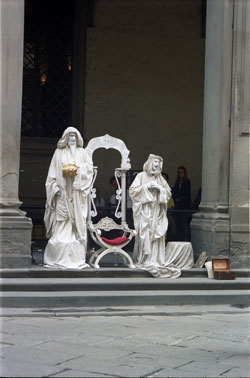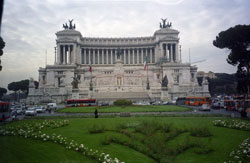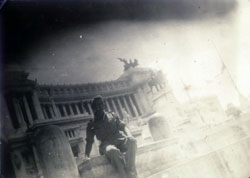World War II: A New Zealand Veteran Looks Back
In Italy on 20th May 2004 the Cassino War Cemetery was the gathering point for several hundred New Zealanders.
A New Zealand commemoration service was held that day to mark the 60th anniversary of the fierce battle for control of Monte Cassino, the gateway to Rome.
Among the 4270 Commonwealth graves are those of 464 New Zealanders. Lying beneath 14 of those headstones are close companions of long ago.
Some had been classmates of school days. Others, members of the Territorial Regiment in which we trained together, to turn civilians into soldiers.
Despatched to the Middle East, we were posted to the same infantry regiment which was one of those given the task to storm Cassino town. At the time of the Cassino battle, the majority of us were 21 or 22 years of age. The gathering in that now peaceful place caused my mind to turn back to youthful days - to the attitudes and outlooks of young men of New Zealand back in 1939.
How did we accept the demand made upon us to go off to the other side of the world and there to fight in a war from which we may never return.
In later life I was asked by Swiss associates why we, from far away New Zealand should have become involved in a European conflict. A reasonable question in the 1980s but just no question at all in 1939. England was the Mother Country - of course she was. (Invariably England - seldom ever Britain). Our education had firmly established that. We lived on a diet of the great men of England. The school history book of that era - “Our Nation’s Story” - told of Lord Nelson at Trafalgar; of the Duke of Wellington at Waterloo; of General Gordon bravely facing fearful odds and going to his death at Khartoum; of the Black Hole of Calcutta and so on.
Yes! England was HOME: even the refrigerated cargo ships that came to carry away our butter, cheese and meat were always referred to as “Home Boats.”
So that when England was attacked by those “terrible” Germans it would have been quite unthinkable not to have gone to her aid. When Prime Minister Savage proclaimed,
on the day war was declared “where Britain goes, we go; where she stands, we stand”, the country as a whole and the young men of it, were solidly behind him.
But superimposed over this patriotic fervour were the thoughts of adventure and travel to foreign lands. Places only dreamt of but light-years
away and with just no prospect of visiting. This was before air-travel and long before the term “O.E.” became an accepted part of youthful
vocabulary. Boat was the only means of travel and in those early post-depression years there was barely enough money for the necessities of life.
To be able to take several months away from whatever work one was able to get was just impossible. But the war was our opportunity.
The greatest fear was that war would end before there was a chance to become involved. The possibility of death never entered the mind.
Anyway, it would always be the other fellow who would be killed - never oneself. So keen were we that I am unable to recall a single complaint
at being required to provide, at one’s own expense basic items that should have been made available by Government. I still have my “call-up” notice.
It states in part “You will bring with you Boot and Button cleaning gear, knife, fork, spoon, 2 plates, mug and tea towel”.
Imagine if you can the reaction of the young men of today if, called into military service paid seven shillings (seventy cents) a day and then be
required to provide such basics at their own expense. But we took up with pride what equipment was issued. This was mainly left-overs from World War I
and totally out-of-date and inadequate but not so in our eyes of those heady days.
We were swept away with fervour and patriotism. By excitement and the spirit of adventure. We all held the conviction of invincibility back then and
could not get to the war front quick enough. Yes! That was the attitude of almost every young man in New Zealand back in 1939. Since then
there have been so far-reaching changes in the world of politics, communication, education and travel. It is almost impossible now, even
for myself, to believe that those attitudes of the World War II era ever existed. Looking from today, the outlook and attitudes of the
young men of New Zealand back in 1939, must be viewed in the light of those times.
Yet even before war’s end those attitudes were to change considerably but always did we retain a firm conviction that individually
we were a match for any German. Our pride in being New Zealanders never left us nor did the confidence that came from being members of
the New Zealand Division. So many thoughts flooded my octogenarian mind as I pensively stood, on that clear May afternoon amid the graves of heroes.
Some recollections had strengthened with the years, others faded and still others had gone beyond recall.
Towards the end of a long life it is understandable that the views and attitudes of young soldiers of 60 years before, have changed
beyond measure. So many years of being involved in the ebb and flow of life’s affairs and the great advances in world affairs and outlook generally.
These have brought maturity with its tempering influence and a greater tolerance to once accepted and firmly held viewpoints. But in my searching now,
for answers to my many thoughts in Cassino war cemetery that day, I should perhaps begin by questioning myself.
Do I now regret my involvement in the war and the several years of my life spent in military pursuits? A frank answer is “No” but qualification
is necessary. Forever remaining are deep regrets over the deaths of so many of my friends and comrades. Regret also of the deaths and
mutilation of many Italian civilians caught up in battles in that country. Surely no civilised person could possibly feel otherwise.
But never do I ponder on why it was that I survived when many around me did not. There is no answer to such a question and living has
taught me that life is fraught with risk and chance. The great scales of fate are beyond the control of Man. Life rests with the Fates’
sister whose shears remorselessly cut short or long the threads of life.
Sincere young men who would have made good husbands, fathers and progressive worthwhile citizens, lie in those Cassino graves. The
loss to New Zealand of so many of my generation was something our developing country could ill-afford. As I stood in that Cemetery my
thoughts were of two whose graves were close by. Tall, good looking always laughing Morrie. From a farming background he was one of life’s “doers”
and could well have left a mark on New Zealand. Employed by one of New Zealand’s bigger stock and station agents his was the potential to have
become General Manager and perhaps of great influence in the dairy industry.
Then there was Harold. Quiet, sincere and unassuming. So keen on music and his main topic of conversation. I can remember yet that
one of his favourites was “The Entrance of the Little Fauns”. What would he have carved out for himself had he not become one of our
K.I.A. So many hopes and possibilities for the future lie in those 464 New Zealand graves.
It was a hard and at times harsh life that young men, especially those in an Infantry Battalion were required to adjust to and accept.
There were downside effects that could severely damage personality and warp outlook. In a climate of authoritarianism, control and collective
responsibility over which was imposed quite rigid discipline, there was the prospect of an individual’s upbringing in terms of
the values and norms of civilian life to be submerged. To some degree the individual was lost to become part of the military machine.
All were forced to dress alike, to act alike, and to obey orders without question. Quite senseless and soul-destroying punishments were
imposed on any who did not.
For those of us who were required to take up arms what were the effects upon our lives? How was one affected by the brutal doctrine
of being trained and sent forth to kill the young men of other nations? The mailed fist left its mark upon us during those several years
of being removed from mixed society into one of men only. Men whose primary task in life was kill or be killed. In retrospect I can see
that by living in such an aggressive culture we became hardened and less sensitive, not so much towards people but to death.
Understandable perhaps when at times, in truth one fully expected to be counted amongst the dead by that nightfall. This caused the
battalion Padre to take me aside on one occasion. He pointed out the dangers to a young person of becoming brutalised in this way.
His was a timely lecture that has stayed with me and guided my outlook ever since.
In all “civilised” societies some actions will always be quite inexcusable regardless of circumstances. I can however understand,
at least to some degree, how it is that seemingly normal men and women can become in the name of the State, perpetrators of horrendous
actions. There are many instances of this in the annals of history and right up to recent times. It seems that by extreme discipline
and iron-fisted control, a point is reached where there is a complete abandonment of standards of human behaviour. Guards in the Nazi
concentration camps of World War II and more recently, the ethnic cleansing in Bosnia are two examples. Not for one moment should it
be thought that any New Zealanders came anywhere near such appalling behaviour. Yet the fact that the Padre thought it necessary to
warn me (and perhaps others) against becoming brutalised was then and still remains much food for thought.
But all things were not bad that came out of those years of conflict. Good arose for the world and for individuals. What sort of
world would we be living in today and how would we be living in our fair land had Nazism, Fascism and Communism been permitted to have
ruled unchecked. Life’s cherished bounties of freedom and liberty would have been extinguished. The physical and mental control of the
masses by a dictatorial elite would have been our lot and that does not bear thinking about. No cost is too high when life under such a
regime is considered. No! Not even the lives of all those young men of New Zealand we left forever in foreign lands.
I still greatly miss those of my young comrades KIA but am solaced in my thinking of todays New Zealanders who remain living free and
fair lives in this fair land. As an individual, my years of military service changed me greatly and for all time. Without a doubt, this
change was for the better. I returned to civilian life with a heightened awareness of individual responsibility and with wider views of
behaviour and citizenship. Also an awareness of more in life than self and with an acceptance that tolerance of others is a prime personal
attribute.
In my life since the war I have ever been conscious to strive to be a good husband, father and citizen and to accept the
responsibilities that each of these bring. Not only for myself and those around me but to honour the memory of my comrades who
really never knew adulthood.
I have found too that my war service has admitted me to an exclusive club of fine men to which no others can ever be admitted.
The mould is broken and cast away. Frequently do I consider how fortunate are we who were privileged to serve in such vintage company.
To accumulate memories that even after 60 years bring a stinging to the eyes. Treasured memories that through life became signposts
to greater effort and inspiration at times when guidance was greatly appreciated. My years amongst courageous and upright men of an
infantry battalion gave me a character that I could not have developed in any other way. I am grateful to my so many reliable
companions alive and dead for their tolerance and support and indeed, so very much more than that, needed to survive in a front-line unit.
I am grateful to have survived the war. I am grateful to have been able to attend, after 60 years, the service on the Cassino
battlefield to honour dead comrades. I am grateful to have been born a New Zealander.
In summary, what I now am is due in part to experiences of war but mostly because of the fine company that surrounded me in my
development years. Like the wedding guest in “The Rime of the Ancient Mariner”: A sadder but a wiser man he rose the morrow morn.
Douglas Froggatt
New Zealand
2004
|
